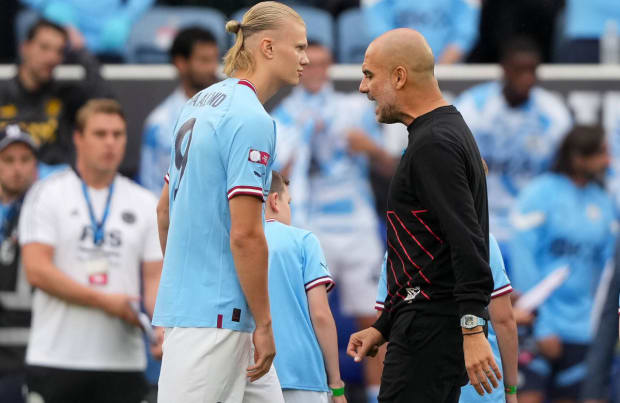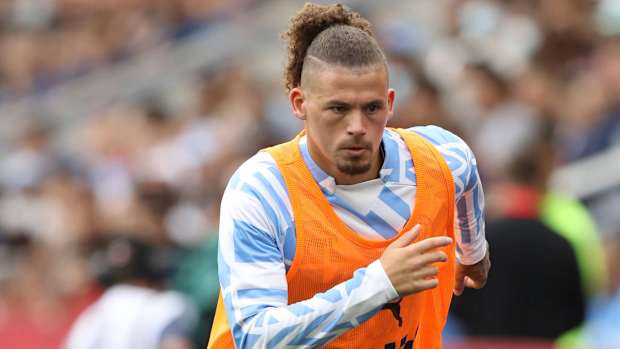View the original article to see embedded media.
On one level, the signing looked terrifying for the rest of the league. Manchester City has won four of the last five Premier League titles. It has been the top scorer in the Premier League in each of those five seasons. And to that side it added, for a bargain price of $60 million, Erling Haaland, a powerful and prolific 22-year-old widely recognized as the most promising young center forward in Europe. How could this not yield even more goals, even more success?
The answer, perhaps, came on Saturday in the Community Shield. Haaland is not a classic Pep Guardiola-style forward. He looks as though he was brought to life in a tower at midnight during a storm. He batters defenders out of the way, at times makes the game look gloriously simple, barging through opponents and smashing in shots. It may be that he gives City an edge it has previously lacked in the biggest European games. But equally there is a risk that he disrupts a precision-based system that has brought so much success.
Haaland’s hero was always Zlatan Ibrahimović, a similarly gifted and physically imposing striker. Guardiola signed him in 2009 for Barcelona, but the move broke down in acrimony, with the Sweden international describing the rest of the Barcelona squad as “obedient little schoolboys.” And there is something in that. The juego de posición favored by Guardiola requires players to assimilate to the system, to repress their egos.

Andy Rowland/PRiME Media Images/Imago Images
Ibrahimović could never do that; perhaps Haaland will, but perhaps not. Posts on social media last week showing him buying Percy Pigs (a fruit-flavored candy) from Marks & Spencer may have been innocently childlike, or may have been pointedly mischievous, an assertion of independence against all the checks City puts its players through. Jack Grealish was brought in last summer for more than twice Haaland’s buyout clause ($139 million), seemingly with a similar aim of adding an element of anarchy to an attack that, although brilliant, could perhaps benefit from a dash of unpredictability.
But it’s not just about personality. There is a clear stylistic disconnect. Haaland is not a subtle player. He does not drop deep or pull wide or generate space for others. That friction may prove creative, but it is a risk. And the very early signs have not been positive. City was well-beaten by Liverpool in the Community Shield, and Haaland was a notably isolated figure. Again and again he made runs that demanded the sort of early pass that City, with its insistence on maintaining possession, so rarely plays.
In the full 90 minutes plus injury time, he touched the ball only 16 times. The positive from that is that those 16 touches included three decent chances, two of which he wasted disappointingly. The other, generated after outmuscling Andrew Robertson, drew a useful save from Liverpool goalkeeper Adrián. And this was a Haaland far from fully fit. In that sense, he made City very un-City-like. Whereas previously the criticism was that in the biggest games against the best opponents it often played well without creating clear chances, on Saturday it was far from its best through midfield but still looked threatening.

Paul Terry/Sportimage/Imago Images
The only other major new signing—forward Julián Álvarez was a winter signing for roughly $18 million, though he arrived from River Plate this summer—is Kalvin Phillips. He is used to playing in a hard-pressing side at Leeds, and his range of passing should be an asset. That he is capable of swift forward balls again suggests Guardiola contemplating a change of style, adding a more direct element to the familiar patient buildup. It may work. It may be that is precisely what City needs to finally win the Champions League, but any rebuild is, by definition, an uncertain proposition.
At the same time, City has offloaded Raheem Sterling, Gabriel Jesus and Oleksandr Zinchenko, all to other “Big Six” Premier League clubs. That again feels like a risk. It’s not just that all three have been reliable performers, it’s that this season they will be performing reliably for direct rivals. Fernandinho, meanwhile, has returned to Brazil.
Then there’s been the pursuit of Brighton left back Marc Cucurella, which seems as though it may not go through because City is reportedly unwilling to match the Seagulls’ fee demand. That, frankly, feels odd. This is Manchester City, a club of essentially unlimited wealth. What lies behind this sudden trimming of the budget and cost-conscious approach? It may be nothing foreboding, but equally the City squad suddenly looks a little thin, especially with Aymeric Laporte injured to begin the season.
Nevertheless, Man City remains the preseason favorite and it may be that the new signings do raise it to a new level in the coming months. But the reshaping of the squad is a risk, and nothing is certain.







